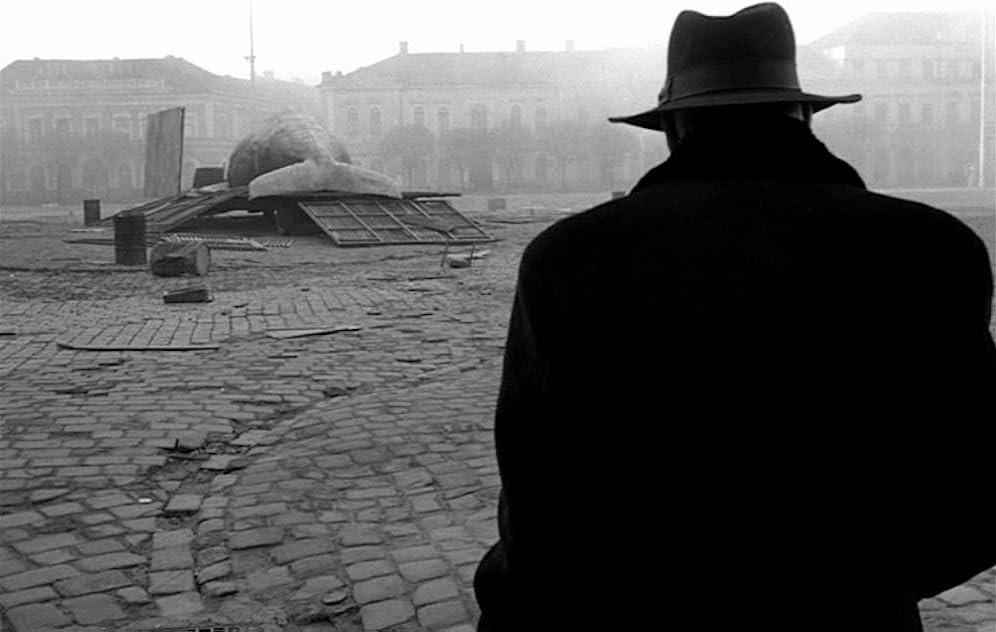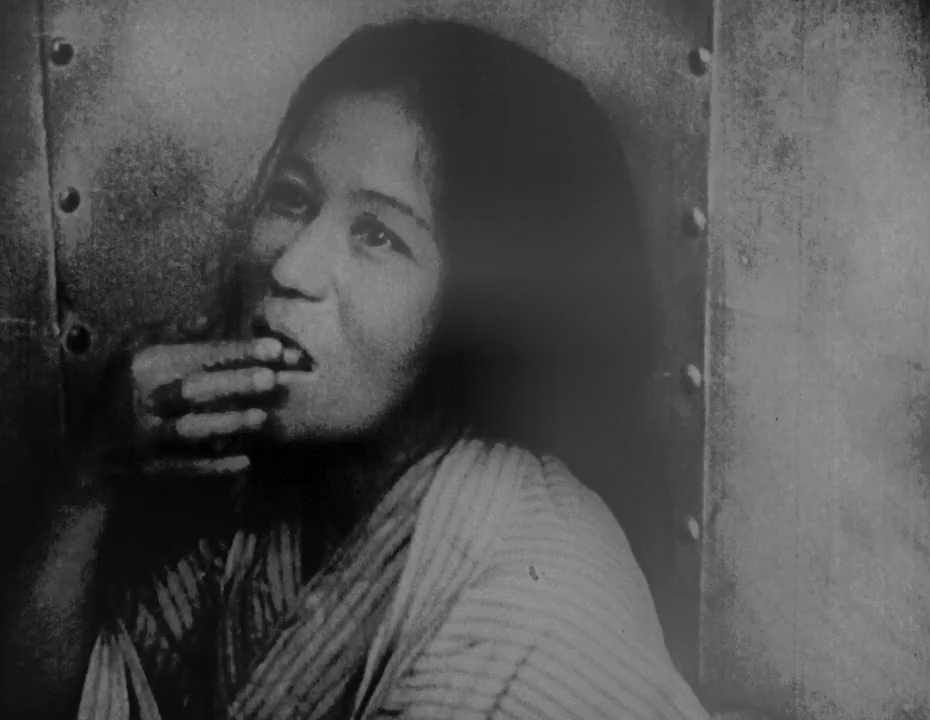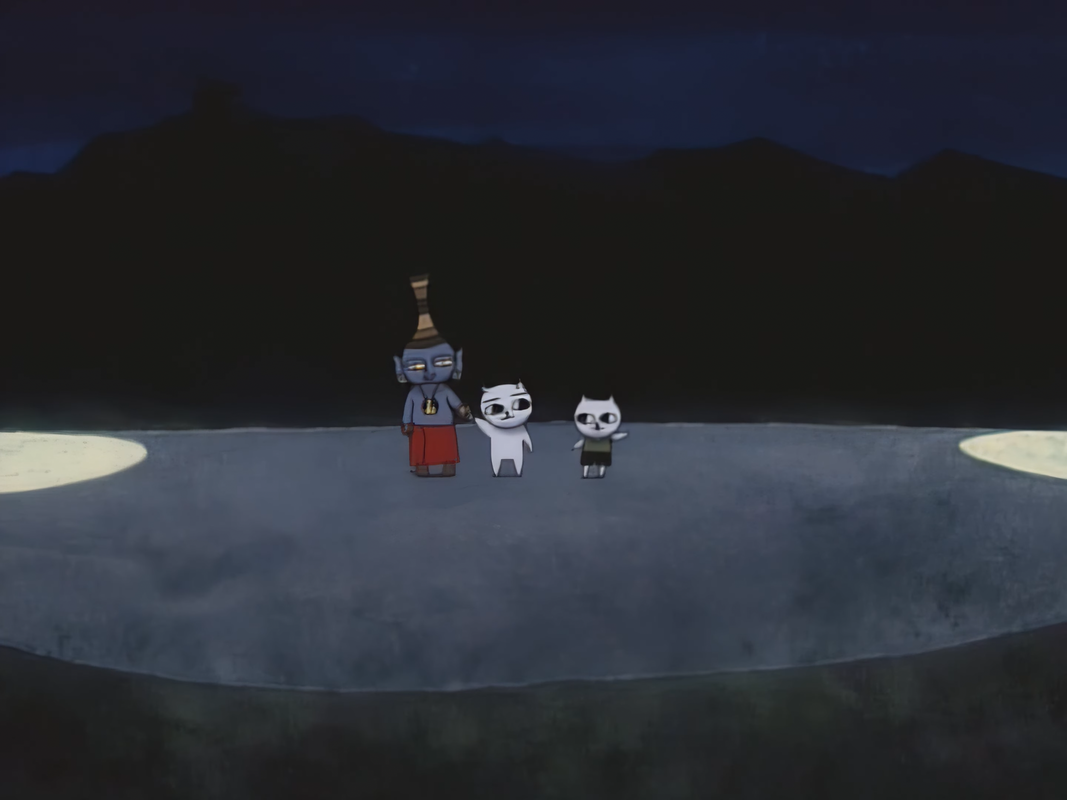Медвежья свадьба [Medvezhya svadba / The Bear's Wedding] (Konstantin Eggert + Vladimir Gardin, 1925)
Sep
28

In preparation of the bear's wedding, a cook – wearing not much more than an apron and a toque blanche – stirs a huge kettle over a roaring fire. DPs: Eduard Tisse & Pyotr Yermolov.
BookAdaptation
“All I ask is that you step with me into the boundlessness, where constancy, quietude and peace, infinite emptiness reign.”Werckmeister harmóniák (Béla Tarr, 2000)
Sep
26
Shamu The Whale Day

A man in a dark hat and coat approaches the whale. The huge creature lays in an enormous open wooden crate in the middle of a town square. DPs: Patrick de Ranter, Miklós Gurbán, Erwin Lanzensberger, Gábor Medvigy, Emil Novák & Rob Tregenza.
– János Valuska
Orlacs Hände [Die unheimlichen Hände des Doktor Orlac / The Hands of Orlac] (Robert Wiene, 1924)
Sep
25

Paul Orlac (Conrad Veidt) stretched out on a wooden bench in a tavern. A strange man sits on a second bench on the other side of the table. DPs: Hans Androschin & Günther Krampf.
“This is the tale of the strange adventures of the young Allan Gray, who immersed himself in the study of devil worship and vampires. Preoccupied with superstitions of centuries past, he became a dreamer for whom the line between the real and the supernatural became blurred. His aimless wanderings led him late one evening to a secluded inn by the river in a village called Courtempierre.”Vampyr, ou l'étrange aventure de David Gray (Carl Theodor Dreyer, 1932)
Sep
25
World Dream Day

Allan Grey (Julian West) sees himself in a coffin in a dream. DPs: Rudolph Maté & Louis Née.
– title card
狂つた一頁 [Kurutta ippēji / A Page of Madness] (Teinosuke Kinugasa, 1926)
Sep
12

The servant's wife (Yoshie Nakagawa) eating. She looks up at someone offscreen, and smiles. DP: Kōhei Sugiyama.
0課の女 赤い手錠 [Zeroka no onna: Akai wappa / Zero Woman: Red Handcuffs] (Yukio Noda, 1974)
Sep
12
National Police Woman Day

Rei (Miki Sugimoto) wielding the red chain of her handcuffs. DP: Yoshio Nakajima.
Rei (Miki Sugimoto) is a member of Division Zero, a top secret division of #Tokyo's police department. Hired to investigate a high-profile #kidnapping, she infiltrates the gang and kills them off with her signature blood-red handcuffs.
0課の女 赤い手錠 is the first of no less than 9 instalments. Based on Tōru Shinohara's #manga 0課の女 [Zero-ka no Onna] who may be better known for his さそり [Sasori / Scorpion], which in its turn was adapted into the popular Female Prisoner Scorpion series of WiP films.
“Are the birds gonna eat us, Mommy?”The Birds (Alfred Hitchcock, 1963)
Sep
10
chicken

Alfred Hitchcock and Tippi Hedren in a promotional photo by Philippe Halsman. Hedren, as her character Melanie Daniels, is attacked by a large crow while Hitchcock calmly enjoys a fried chicken and a glass of wine. DP: Robert Burks.
Feeling rather peckish.
– You want a leg or a breast? – You make the choice.To Catch a Thief (Alfred Hitchcock, 1955)
Sep
8
leg or breast

Francie (Grace Kelly) and John Robie (Cary Grant) taking a (lunch) break on the Grand Corniche coast road. DP: Robert Burks.
“I've got it. Film star! You'd be perfect. Dark glasses, lots of red lipstick, and 100,000 rupees per picture. And if it's a Hindi film, we'll all fly to Bombay.”মহানগর [Mahanagar / The Big City] (Satyajit Ray, 1963)
Sep
6
freebie: National Lipstick Day

Edith (Vicky Redwood) applying colour to Arati's (Madhavi Mukherjee) lips. DP: Subrata Mitra.
Set in 1950s Calcutta, মহানগর is a story of emancipation in a changing society. Arati (Madhavi Mukherjee) is a housewife from a traditionalist family, who – in order to support her relatives' lavish demands – goes out to work as a door-to-door saleswoman. Slowly, she discovers her independence.
– Bani
ねこぢる草 [Nekojiru-sō / Cat Soup] (Tatsuo Satō, 2001)
Aug
30
National Grief Awareness Day

Nyāko taken away by Jizō with little brother Nyatta telling Nyāko to come back home. DP: Masaru Takase.
Nyatta is not ready to have Jizō take away his big sister Nyāko to Ne-no-kuni, the land of the dead. The kitten grabs his sister's paw, resulting in her soul being ripped in two and leaving Nyāko in a state of limbo. The cats' mother then sends the two off on a mission to buy fried #tofu. Maybe now Nyatta can find a way to put Nyāko's divided soul back together. But first, there's a circus to visit!
ねこぢる草 is based on works by mangaka Nekojiru / ねこぢる (1967—1998) whose trademark crudely drawn #cats caused a ripple in Japan's underground #manga circuit. Nyatta and Nyāko continued their surreal adventures by way of widower Yamano Hajime after Nekojiru's tragic suicide in 1998.